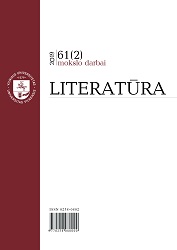Рубенс в русской поэзии: от экфрасиса к идеологии и обратно
Rubens in Russian poetry: from ecfrasis to ideology and vice versa
Author(s): Alexander MarkovSubject(s): Cultural history, Poetry, Visual Arts, Semiology, Aesthetics, Russian Literature, History of Art
Published by: Vilniaus Universiteto Leidykla
Keywords: Rubens; Pushkin; Dostoevsky; Bryusov; OBERIU; ecfrasis; audience; pictorial composition; pictorial plot; picture analysis;
Summary/Abstract: Although the name of Rubens was included in the canon of well-known Western European artists in the Russian 18 century and his style was quite recognizable, an appeal to the artistic poetics of Rubens was rare, and Rubens’s eccentricities, created by Valery Bryusov and Nikolai Oleinikov, are full of ambiguities and obscure places. The article clears up all these obscurities based on the enlightening notion of Rubens as an artist capable of only a local mimesis, of portraying the life of Flanders, but not of a classic imitation of nature. This thesis was adopted by Pushkin and Dostoevsky and gradually acquired a moralistic and historicist meaning: Rubens depicts the characters, not the nature of a person, which means that he portrays the vice mainly and draws the viewer into the vicious circle of vice. The reevaluation of Baroque art at the beginning of the 20th century and the symbolists’ dreams of immersive theater required a different look at the audience’s involvement, thereby turning Rubens into an artist who could simulate the revolutionary activity of the crowd. At the same time, Pushkin’s idea of Rubens as an artist of arbitrariness, and not freedom, supported by the cultural image of Paul I as a collector of Rubens, was retained in Russian literature of the twentieth century.
Journal: Literatūra
- Issue Year: 61/2019
- Issue No: 2
- Page Range: 150-161
- Page Count: 12
- Language: Russian

